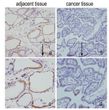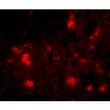DACT2 Rabbit Polyclonal Antibody
Other products for "DACT2"
Specifications
| Product Data | |
| Applications | IF, IHC, WB |
| Recommended Dilution | WB: 1 ug/mL, ICC: 2.5 ug/mL, IF: 20 ug/mL |
| Reactivities | Human, Mouse, Rat |
| Host | Rabbit |
| Isotype | IgG |
| Clonality | Polyclonal |
| Immunogen | Dact2 antibody was raised against a 12 amino acid peptide from near the amino terminus of human DACT2. |
| Formulation | PBS containing 0.02% sodium azide. |
| Purification | Affinity chromatography purified via peptide column |
| Conjugation | Unconjugated |
| Storage | Store at -20°C as received. |
| Stability | Stable for 12 months from date of receipt. |
| Gene Name | dishevelled binding antagonist of beta catenin 2 |
| Database Link | |
| Background | The Wnt signaling cascade is a conserved process in multicellular animals that plays important roles during development and can contribute to cancer and other diseases. Many members of this pathway are also expressed in the postnatal tissues such as brain. One such protein is Dact2, a member of the Dact protein family that was initially identified through binding to Disheveled (Dvl), a cytoplasmic protein essential to Wnt signaling. Dact2 is most prominent during the development of the thymus kidneys, and salivary gland. Dact2 is thought to play a role distinct from that of Dact1 with Dact2 having a greater impact on a b-catenin-independent process termed planar cell polarity/convergent-extension signaling. Furthermore, Dact2 but not Dact1 can inhibit Nodal signaling by promoting the endocytic degradation of TGF-b receptors. At least two isoforms of Dact2 are known to exist. |
| Synonyms | bA503C24.7; C6orf116; DAPPER2; DPR2 |
| Reference Data | |
Documents
| Product Manuals |
| FAQs |
{0} Product Review(s)
0 Product Review(s)
Submit review
Be the first one to submit a review
Product Citations
*Delivery time may vary from web posted schedule. Occasional delays may occur due to unforeseen
complexities in the preparation of your product. International customers may expect an additional 1-2 weeks
in shipping.






























































































































































































































































 Germany
Germany
 Japan
Japan
 United Kingdom
United Kingdom
 China
China






